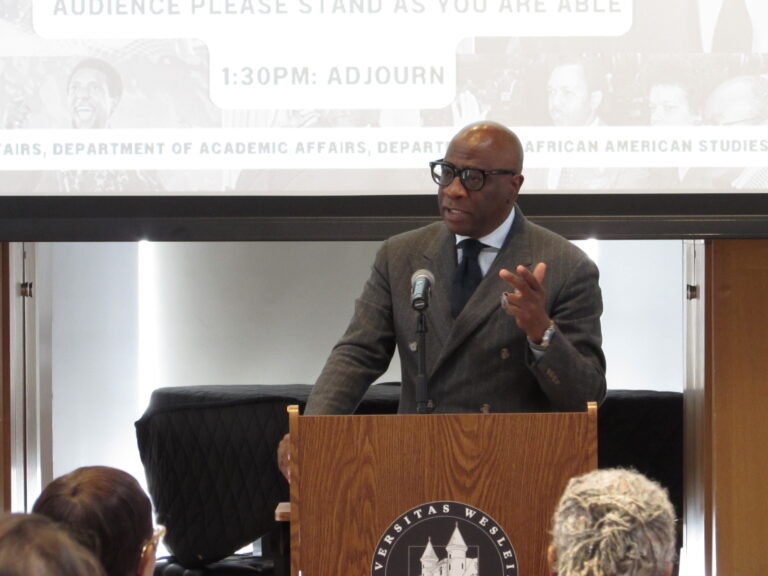Psi Upsilon House Closed for 2015-2016 Academic Year
On Monday, August 3, President Michael Roth and Vice President of Student Affairs Mike Whaley announced the closing of the Psi Upsilon (Psi U) house in a campus-wide email. The fraternity house will be closed beginning in the fall of 2015 due to allegations of illegal drug activity occurring in the house.
“We have been informed by State and Federal prosecutors that they are actively investigating illegal drug activity at Psi Upsilon that allegedly involves members of the organization,” the email reads. “Specifically, we have received written notice that on several occasions some members have organized group purchases of narcotics.”
In addition to the closing of the house, this incident may result in other disciplinary consequences for students involved.
Currently, the ban on the fraternity house will last for the 2015-16 academic year. Students will be prohibited from living in the house, and the property will be off limits to all University students. According to the email, any student found at the property will be subject to judicial action by the University.
The Psi U leadership expressed its disappointment in the University’s decision in a statement sent to The Argus via email.
“The loss of our house…disrupts the growth of our organization, especially during this time of transition,” the statement read. “We cannot host rush events for prospective new members. Last semester 135 students rushed Psi U. It will be very difficult to accommodate this amount of students when we can’t even use our own space, let alone share it.”
Additionally, the fraternity’s leaders stated that the mention of multiple group purchases of narcotics in Roth and Whaley’s email is erroneous. They maintained that there was only one alleged incident of attempted drug purchases by a group, which resulted in no formal charges.
“President Roth omitted important information,” the statement reads. “No drugs were purchased and no dealer was apprehended. President Roth also failed to specify that this incident occurred during senior week, when most of our membership had left school, the chapter was effectively not operating, and there were non-members residing in the house.”
The University’s Inter-Greek Council (IGC) Secretary Nikki LeFlore commented on the IGC’s limited involvement in discussions surrounding the closure of Psi U.
“The IGC played no role in this decision, which is disappointing being that during the past semester we have had frequent communication with the administration and were also told that we would be kept in the loop as the administration made important decisions like this,” LeFlore wrote in an email to The Argus. “Hopefully the leaders of Psi U weren’t kept in the dark throughout the administration’s decision making process.”
The Psi U statement echoed LeFlore’s concerns about a lack of transparency between the administration and the Greek organizations on campus.
“Despite his commendable efforts, the Greek [Life] Coordinator was informed of our suspension on the same day as our undergraduate leadership,” the statement reads. “Such a failure to regulate disciplinary matters through the mechanism proposed by the WSA and approved by North College suggests that the decision to suspend our house was made by a higher authority who had no interest in honoring the due process agreed upon by both staff and students.”
However, in an email to The Argus, Whaley refuted the claim that the administration withheld information from the leaders of Psi U.
“[We] spoke with Psi U leadership about the allegations early last week,” Whaley wrote. “They were not ‘kept in the dark’ about this issue. The IGC and Greek Life Coordinator do not have a role in program housing decisions.”
Following the closure of the University’s other two fraternity houses last year, Delta Kappa Epsilon (DKE) and Beta Theta Pi (Beta), this event marks the end of fraternity housing on campus for the foreseeable future. The administration’s call for coeducation caused DKE to close its doors at the end of the spring 2015 semester and led to a highly publicized lawsuit between current DKE members and the University; the lawsuit is still pending, but a motion to allow members back into the house for the 2015-2016 academic year was denied by a Middletown judge over the summer.
Despite Psi U’s success with coeducation in its pledge class last spring, the house will be closed to members and students as the result of what Charles Salas, Director of Strategic Initiatives at the University, referred to as “information received about illegal drug activity occurring there” in an email to The Argus.
“Psi U’s program housing status will be reconsidered after the investigations have been concluded and the University has more details,” Salas wrote.
According to Salas, Roth; Whaley; and other senior staff members collectively made the decision to close the Psi U residence. The fraternity’s leaders were informed on Friday, July 31, and the other Psi U residents were informed of this decision this morning, prior to the release of the email.
In their statement, the leaders of Psi U voiced discontent with the level of contact the University had with the fraternity prior to Friday, July 31.
“Before [Friday] it had not been communicated to us that the loss of our house was even a possibility,” the statement read. “In fact, the majority of our membership was still unaware of the May incident, given that it occurred during senior week, which President Roth’s announcement failed to specify. It is concerning that this decision was announced over two months after the event occurred, yet no communication was established before then…. It is disturbing that the university withheld information about the possibility of a drug dealer in our organization.”
Additionally, Director of Residential Life Fran Koerting contacted the students who had planned to live in Psi U during the upcoming academic year this morning in order to inform them of their housing options.
“We sent a list of available spaces to all the residents this morning, asking them to let us know their top three choices, and if they have someone in the house they would like to live with if it is a double occupancy space,” Koerting wrote in an email to The Argus.
Despite the Office of Residential Life’s attempts to find suitable housing for would-be Psi U occupants, many have expressed dissatisfaction with the alternatives that have been presented to them.
“It totally changes what they thought their housing situation was going to be like this year, from having a single room in a house with 20 other members of Psi U to being spread across campus, several of them having to share a room together,” Koerting wrote.
Psi U Fraternity, which has over 30 active chapters and colonies in the United States and Canada, has suspended all activities of its Wesleyan chapter, known as the Xi Chapter, pending investigation. Executive Director Thomas Fox was quoted expressing dissatisfaction with the alleged behavior of members of the Xi Chapter in a press release this afternoon.
“We are disappointed to hear that Psi Upsilon members may have been involved in illegal drug activity and will hold an investigation into this issue to determine the truth of the allegations,” Fox said. “Illegal drug use is unacceptable and not congruent to the values of our fraternity, and any members found guilty will be held accountable for their actions. Once we conclude our investigation into the matter we can better decide a direction for the chapter as a whole.”
The campus-wide email further addresses the administration’s dissatisfaction in the conditions that led the University to close the fraternity.
“This turn of events is deeply disappointing for so many of us,” the email reads. “It is certainly a blow to alumni and students who care for Psi U, and that includes the new women members who had planned to live there this fall.”
The statement from Psi U also expresses frustration with the outcome and handling of the incident. The fraternity also published a Wespeak on the matter.
“There has been a tremendous failure on the part of the administration to honor our mutual commitment towards improving the campus,” the statement reads. “We have done our part. Co-education was a huge success despite absolutely no assistance from North College. We introduced new community service projects on our own terms. We abided by unfounded demands to provide information about our pledge process and attend hazing seminars. It’s pretty devastating to see how quickly the administration turned their back when they needed a scapegoat for an unconfirmed incident, especially one that is clearly more a symptom of the Wesleyan campus than Psi U.”







This is almost comical. “The house will be closed to members and students as the result of what Charles Salas, Director of Strategic Initiatives at the University, referred to as ‘information received about illegal drug activity occurring there’ in an email to The Argus.” A similar institution on campus not only sold drugs, but bad drugs, which put 11 students in the hospital, nearly killing one, something that made national news. Roth did not ban than society, hey, they didn’t even get a suspension! Now, I don’t know about you all, but it seems a bit off what wesleyan is doing, when they solely receive information about “illegal drug activity” inside Psi U, and they are so quick to boot them off campus. Roth is a tyrant looking to control all social spaces on campus. Hm……. it seems like he has a bias against fraternities, but thats just me. Not to mention, the society that had 4 students arrested and sent 11 people to the hospital, is know for its drug culture, and has a large history of drug use on its grounds.
You should check your facts more. Eclectic didn’t sell the drugs that put people in the hospital. People who got sick were present at the institution at the time but they weren’t responsible and they didn’t provide those drugs. Also, the people who got arrested weren’t members of that society. But I do agree that Psi U is being unfairly targeted for something that is prevalent throughout the campus and that it is because of Michael Roth’s personal vendetta against Greek life.
Some of us understand, even as early as a pre-kindergartner at an indian summer camp, that the tribal instinct of human nature is a force that is often stronger than logic, reason and authority. It is also what makes life fun, what attracted us to want to apply to a school with so many diverse groups that we were led to believe that we could join of our choosing.
As if I needed another reason not to donate.
What, you mean President Roth is not going after Eclectic ??? I am SHOCKED
http://roth.blogs.wesleyan.edu/2009/03/25/eclectic/
I hope that a WesU paid or volunteer student that cuts the grass and/or trims the bushes on the Psi U “property” is not subject to punishment. Psi U holds a very prominent spot on the campus, and I would not like to see it grow into a jungle.
Perhaps the building could be leased out from its owners, as a guest house or some sort of art exhibit.
According to the 2013 Clery Report, there were something like 240 drug related incidents at Wesleyan, and they are so concerned about an investigation (but not a finding yet) that they just have to act?
When will the school suspend the administrators who oversee student dorms, which is where most of the drug use takes place?
That building reminds me of a stately matronly woman from another century. Is this the administration that likes to beat up old women?
Fascist Democrats didn’t learn from what happened at Duke or UVA. Also, the Feminazi hypocrites who demanded that fraternities go co-ed are often the first to whine when women’s schools and other institutions go co-ed.
roth’s intentions have never been purely to protect the student body at wesleyan. he has been leveraging the general news in the media against greek life in general to his favor and hope of acquiring the fraternity houses. proof of his intention for unjustified acquisition of private property through manipulation of law and abuse of authority can be seen in the attached docs.
Wow. This is very disquieting. All the talk about equity and inclusion was just a façade? Shameful. Why would the Board allow this. Are they all just puppets? Don’t they have fiduciary duty? What about all of the current undergrads who are just pawns in this power play?
Jesus even the President is a screw up. One person sells dope without the knowledge of the rest of the Frat and he closes it all down. Way over the top Roth. I see we have another douche bag for a University President
I did not see Wesleyan considering closing itself down for a year when drugs in the dorms nearly killed several students. Mainly because doing so would have been wrong and stupid. Essentially this is punishing all members of the group for the (alleged only) transgressions of an individual. Is this really the standard that Roth wants applied at Wesleyan? The school has lots of groups and likely many of them contain people acting contrary to law or school rules from time to time. Who shall be closed down next when a member violates some standard?